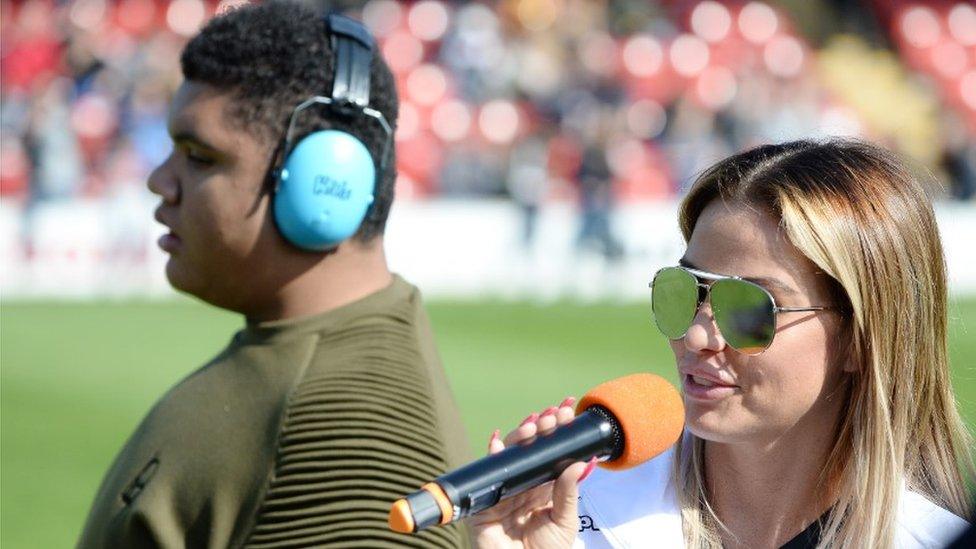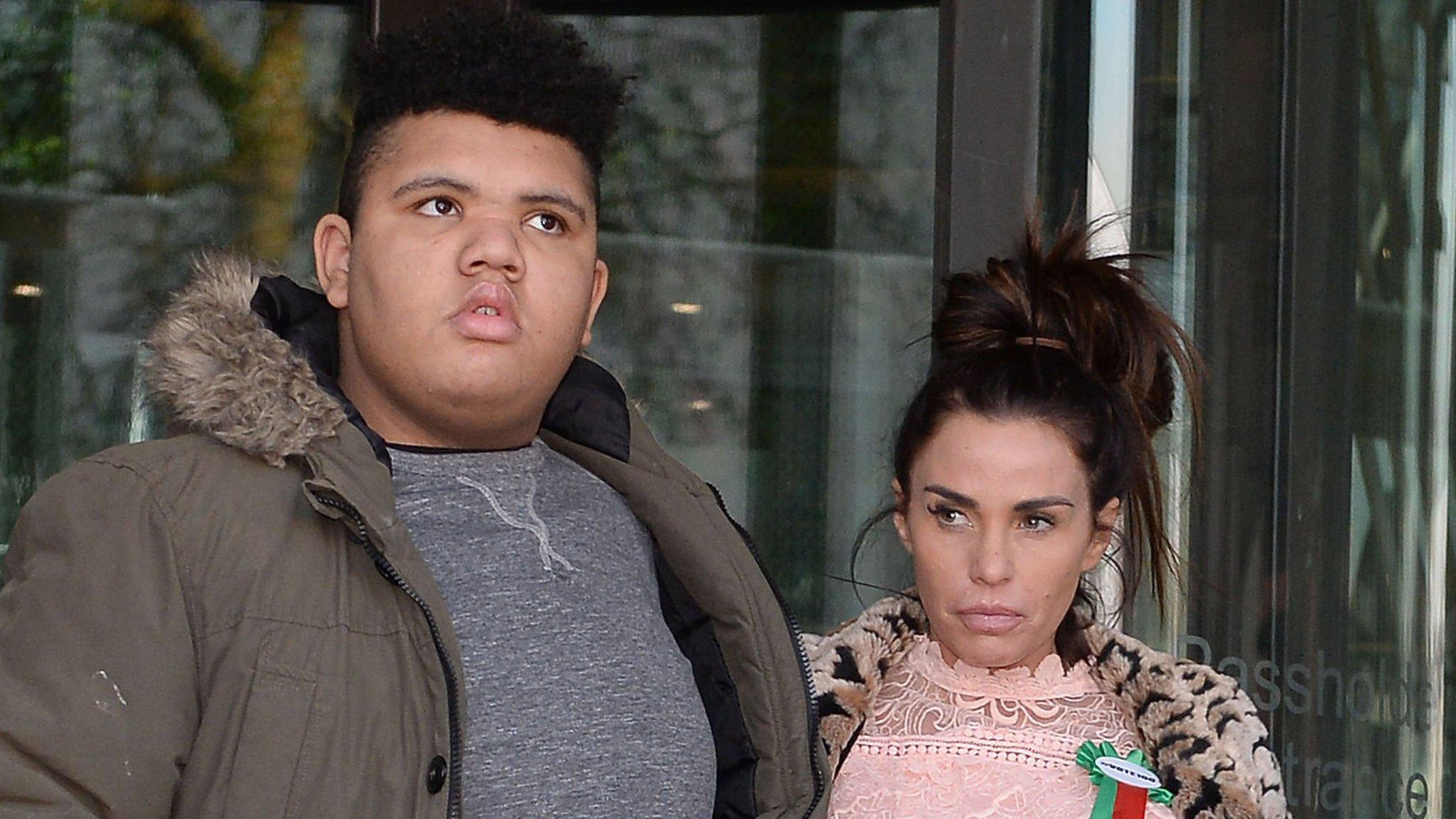Katie Price on Harvey's 'terrifying' move to a specialist college
- Published
Listen to the disabled 18-year-old and his famous mum on the BBC Ouch podcast
When faced with having to move their disabled child to a different school or college, families face difficult decisions. Now, reality TV star and ex-model, Katie Price, is on that journey with her eldest son, Harvey, who is about to make that transition.
It was a quiet 18th birthday for Harvey. There were balloons in the garden and presents were opened, including a frog lunchbox and an iPad. For a treat, Katie took him to one of his favourite places - the local train station.
"This is the best train ever. I love it," Harvey says, taking photographs.
His birthday marks another milestone. It is time to leave school and find a college, a process the family has filmed for BBC One documentary, Katie Price: Harvey and Me.
"It's pretty predictable to know what will happen with the other kids," Katie says, who has four other children. "But with Harvey it's not predictable because he's got complex needs."
She says searching for a specialist college has been a "new journey" for her. "It's not easy and it's terrifying."
Harvey was born in 2002. He was diagnosed with Septo-optic Dysplasia, external, a rare genetic disorder affecting his eyesight, as well as autism and Prader-Willi syndrome, external which can cause learning difficulties and behavioural problems.
He is unable to control his weight and requires 24-hour care.
"It's not straightforward, where you can just choose a college," Katie says. "They have to have the right nursing team and know how to deal with his challenging behaviour."
In the UK, children with long-term health conditions are cared for by child health and social care services until they turn 18 and transfer to adult services.
Katie Price and her son Harvey in a crucial year of his life
It can be a precarious moment and often involves a lot of upheaval including meeting new teams and specialists.
Like many families, the Prices have been warned the most suitable college may be a long way from their Essex home, because there are few of them and they are widely dispersed.
For Harvey, the most appropriate include those in Camden, Wales, Sunderland and Somerset.
The distance, and Harvey's age, means he will become a full-time residential student, including weekends.
To make sure they find the perfect home, Katie and Harvey have visited as many as possible. It was a process made difficult by Covid-19 and Katie having broken the bones in both her heels in a water park accident.
'Crisis point'
"He needs to have his independence and I think he'll enjoy it - make friends," Katie says. "I want him to be in a room with his mates while he plays the keyboard and sings his songs."
At Harvey's current school he is a weekly boarder. Making the decision for him to board was difficult and prompted by the distress he felt at the daily travel from home to school, and the impact on the family.
"I was at crisis point," Katie says. "It was affecting the other kids, it was the danger-zone for him, smashing the house up.
"I hated him going to residential. I cried. But I saw he was happy there."
As the documentary reveals, there are holes in the walls of the Price house where Harvey has punched them.
His autism can lead to meltdowns when he becomes overwhelmed or distressed by a situation. For Harvey, loud noises like slamming doors can trigger this and lead him to hit his head or punch a wall - common coping mechanisms.
It is a situation Katie had to consider when they looked at colleges - would Harvey be safe? Could the staff handle him?
Katie Price opens up about her decision to move her son Harvey to a residential college
During a visit to The Orpheus Centre, a college in Surrey which provides therapy to disabled young adults through the performing arts, a loud and unexpected noise distressed Harvey and he threw his head repeatedly against a door.
Katie told him to count to 10 to control the stress but another noise sounded and he kicked out. The staff encouraged him outside where it was quieter, but it signalled the end of the visit.
Katie will often touch Harvey or speak with him to maintain his calmness. The duo banter constantly and have scripted phrases they say to each other - when Harvey says "Hip, hip," Katie replies, "Hooray".
The scripting is sometimes considered similar to stimming (self-stimulatory behaviours) that many autistic people like to use to relieve anxiety or show happiness.
When they visited National Star college in Cheltenham, Harvey was distressed and worried he would have to stay overnight.
He didn't want to get out of the car and whimpered. Again, Katie reassured him and encouraged him to wear his ear defenders. Because this isn't a regular day for Harvey, the teacher, Alice, showed him a "social story" with pictures of what he could expect from the hours ahead.
She decided to begin at the end with "goodbye" - so Harvey knew he would go home.
It was a difficult start, but when he visited the flats the students live in - with their own bathrooms and kitchens - and got to watch frogs and trains on a big screen in a sensory room, he was won over.
He described the college as "wicked" and excitedly said "yes Mum" when asked if he would be happy there.
Katie says: "The reason I want him to go full-time residential is because some weekends they might have disco nights or bowling and he might want to go and do that and not just come home to me. It gives him a choice."
But it is far from a done deal. It relies on much administration and the local authority agreeing to finance it.

Lynette Barrett, chief operations officer at the college, tells Katie: "We would put in a funding application to your local authority and that application would detail everything that we are going to provide for Harvey.
"For someone that is a part-time day student that may be £15,000 to £20,000 a year. For a student that is full time, all-year round residential with really high health care needs, that could be up to £300,000 to £350,000 a year."
It will be the Prices' local authority which makes the decision on whether to fund it or it may decide somewhere local is suitable.
The approval depends on Harvey's needs. Katie must ensure his Education Health and Care Plan (EHCP) - a legally binding document in England detailing the support he must receive - is up to date.
"Everything about Harvey is in that plan," she says. "It's so time-consuming and you feel like you're alone, but you've just got to get on with it."
Katie must detail Harvey's education attainments, health problems and the medication he requires, as well as the tasks he can complete - whether he can cook for himself, dress, make the bed and wash.
The thought of Harvey leaving home is daunting for Katie, but a move she wants to pursue.
"As much as you smother your kids and you want them with you all the time, sometimes you have to let them go, just give them that bit of space to go and explore."
This year has been challenging for the family. Harvey is classed as extremely clinically vulnerable and has been shielding during the pandemic. He also spent some time in intensive care and his health is a constant concern.
"With Harvey the future is unpredictable, but I'll make sure that he's in a place where he thrives on happiness, excitement, joy and he looks forward to waking up."
Katie and Harvey have applied to National Star. They will find out in March if they have been successful.
UK viewers can watch Katie Price: Harvey and Me on Monday 25 January at at 20.30 GMT on BBC One and BBC iPlayer.
For more disability news, follow BBC Ouch on Twitter, external and Facebook, external and subscribe to the weekly podcast on BBC Sounds.

Related topics
- Published22 January 2019
